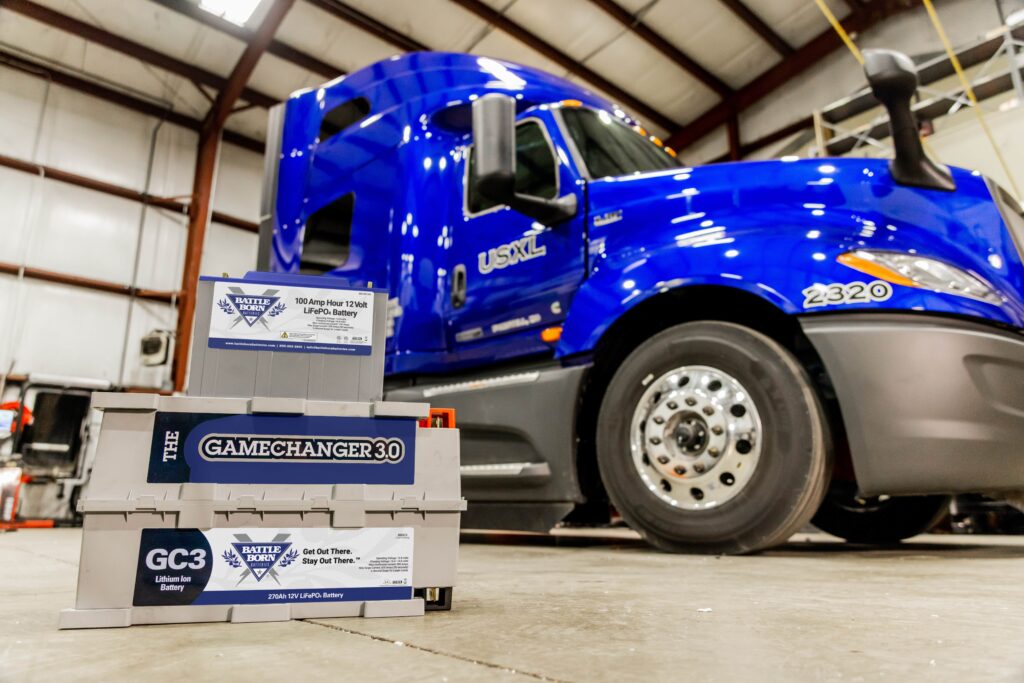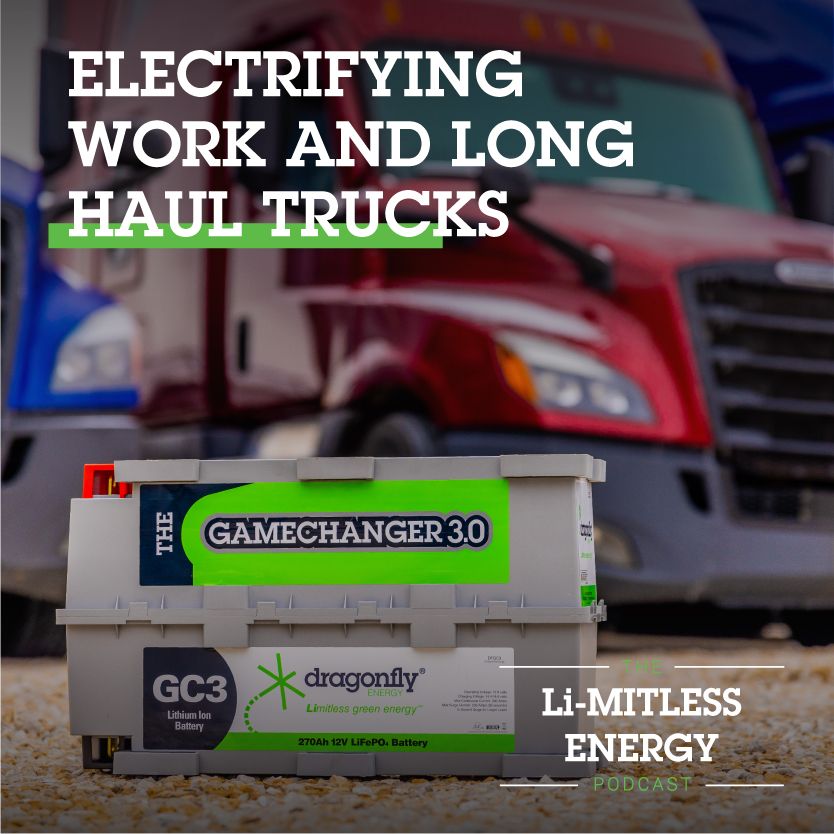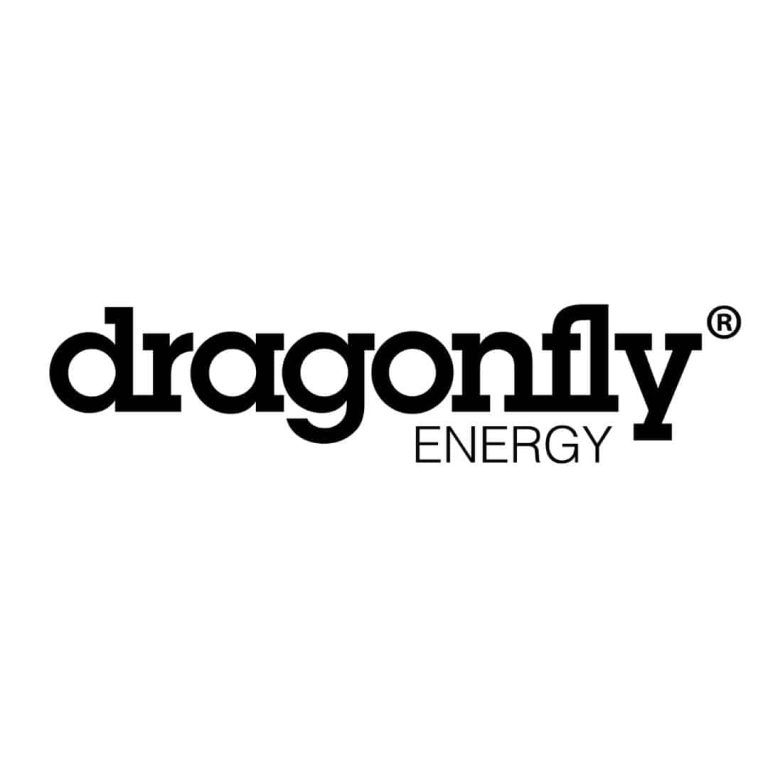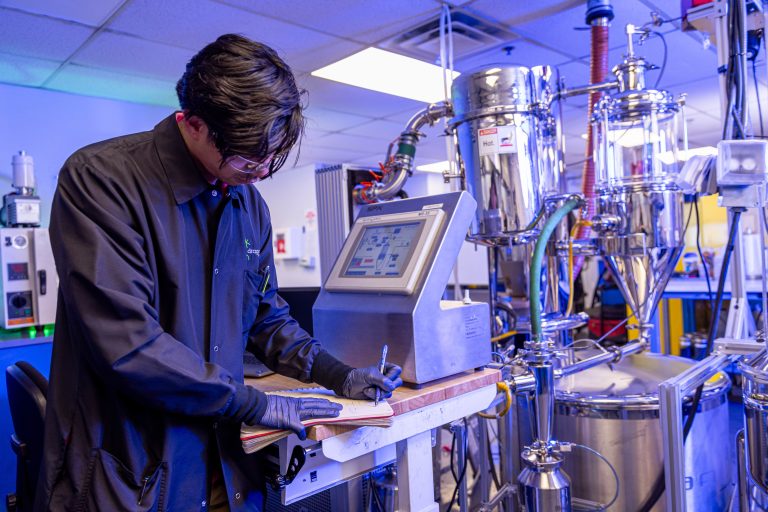Reliable and powerful batteries are essential to work- and long-haul trucks. These trucks each have various equipment and electronics necessary for life on the road that need a constant power source. Currently, these power needs rely on idling engines that put unnecessary strain on the environment and trucking companies’ bottom line. On this episode of the Li-MITLESS ENERGY Podcast, Dragonfly Energy’s OEM Product Manager, Steve Carlson, dives into powering auxiliary equipment in work trucks of all kinds using lithium-ion batteries.
How Lithium Batteries will be Essential to the Future of Long Haul and Work Trucks

Following 15 years in the inverter industry, Steve Carlson joined the team at Dragonfly Energy with a passion for the electrification of industries that currently rely on diesel engines and generator power. Through the implementation of lithium batteries in long-haul and work trucks, Original Equipment Manufacturers (OEMs) can improve driver comfort and address their environmental impact. Steve has witnessed first-hand the hesitation of major players in the trucking industry in transitioning house batteries to lithium. With so much focus being placed on full electrification, this crucial step is being looked over. Proper lithium battery education of industry associations, OEMs, and customers will drive significant growth and environmental change.
On the latest episode of the Li-MITLESS ENERGY Podcast, host Denis Phares welcomes Steve Carlson, a member of the Dragonfly Energy team, to discuss the application of batteries in work trucks and semi-trucks. Together they explore why batteries are important in these vehicles, highlighting the use of auxiliary batteries for running equipment and how it’s relevant in the shift from lead acid to lithium batteries. Denis and Steve also touch on how the capabilities of lithium house systems will aid in the elimination of generators.
Listen to the full episode or watch the recording on our YouTube channel to learn more about the benefits of using lithium batteries in the trucking industry.
Podcast Transcript
Denis Phares: 00:15
Hi, I’m Denis Phares, and today I’d like to welcome to the Li-MITLESS ENERGY Podcast, a relatively new member of the Dragonfly Energy team, Mr. Steve Carlson. Steve. Welcome.
Steve Carlson: 00:26
Thanks, Denis. Good to be here.
Denis Phares: 00:28
So, Steve, today, I’d like to focus on an industry that you’ve been very prominent in, I would say, which is the application of batteries, in trucks, in work trucks, in semi-trucks. Maybe we can start out by talking about why batteries are important in a work truck or in a semi.
Steve Carlson: 00:52
Yeah, so I mean, batteries have always been used in in these vehicles, because there’s a lot of extra loads that that, you know, like, from different types of working loads, especially in the work vehicle or a utility vehicle.
Denis Phares: 01:05
Which is, we should specify this isn’t the cranking battery in those trucks, but the actual house battery.
Steve Carlson: 01:09
Yeah, it’s auxillary batteries for running, you know, equipment, they’ll have inverters, they’ll have other items that, you know, like charging of tools, different things where they’ve always used auxiliary batteries for that. And so, you know, obviously with going to lithium, it makes a big difference.
Denis Phares: 01:30
And so historically, these were lead acid.
Steve Carlson: 01:32
Yeah, always AGM lead acid batteries. Yep. Yep. Typically.
Denis Phares: 01:36
So, what has changed the industry? Or how have the customers adapted to the new capabilities of lithium house systems?
Steve Carlson: 01:46
Yeah, so as you know, as lithium is started becoming more prominent in the last few years, the main thing is that, that they’ve realized that they can eliminate generators, you know, so generators were a big, big part of this, it was always, you know, there was always into a generator install on most of these work vehicles. And then what they realized that with the, you know, the energy density and space savings that you get with lithium, they were able to eliminate the generator, or at least not have to use it as much downsize it, you know, into a battery charger, rather than the actual source of source of power.
Denis Phares: 02:21
Why were the generators a pain point?
Steve Carlson: 02:25
Maintenance, noise, you know, pollution, it’s, it’s just, you know, it was always, you know, an extra nuisance for the service team, you know, for these vehicles.
Denis Phares: 02:37
So, in a semi, for example, you’ve got a driver sleeping in his cab.
Steve Carlson: 02:42
Yeah, yeah, I mean, the sleeper cab situation is similar to, you know, it’s their home, you know, they, they want to be comfortable. And that’s, you know, in, especially in the last 10 years, it’s been really difficult to get enough drivers. So, the OEMs, and the fleets are working really closely and diligently to improve the living space for their drivers. And so, the one thing that has, you know, become almost standard is, is the, you know, like, they call it hotel loads, so it’s, you know, like the comforts of home, in your, in your sleeper. So, lithium batteries, or just batteries in general, being able to have, you know, television, microwaves, refrigerators, all these things that you would, you know, you’d have in a hotel room or at home, you can have in your truck now.
Denis Phares: 03:33
So how prevalent is lithium in that situation now?
Steve Carlson: 03:38
Not very, surprisingly, yeah. So, it’s, it’s definitely something that I think is, is about to take off. And, and the reason obviously, is, you know, what they know, the biggest part of the industry is, is the comfort again, of the driver. And so, what they’ve done in the past, they would put a second small diesel engine on the truck, to be able to run all these loads, they have air conditioning, refrigeration, you know, refrigerator, microwaves, and all the power you would need. But now, they can, you know, there’s a lot of a lot of people trying to eliminate idling of any kind, not, you know, first of all, it was the big truck engine idling. Now we have these small diesel engines that are idling and, and so you can eliminate all of that with, you know, by using batteries. But the problem was, they needed to be able to, these batteries needed to be able to support Air Conditioning for 10 hours, that’s a rule in the industry, like, you know, we need to be able to let these drivers take their period of stop and be able to be comfortable for those 10 hours. And what happened was, you know, the lead batteries it wasn’t enough room or space for enough batteries to allow them to make it that 10 hours. So, they kept making air conditioning systems smaller. So, they didn’t really cool very well. And so, you know, by switching to lithium, you’re saving a lot of space. And you actually have enough power to make that 10 hours, but also increase the cooling capacity. And so now that drivers even in Arizona, in the summertime can be can be very comfortable with the change to lithium.
Denis Phares: 05:23
It’s crazy to me that it’s not more prevalent now. I mean, especially this week, when you see that Tesla delivered two electric semi-trucks. Yeah. Right. So, they’ve, they’ve gone to great lengths to design a system where the entire truck with a payload is propelled with lithium batteries. Yeah, but there’s, there’s so much more lower hanging fruit here. Right?
Steve Carlson: 05:46
Yeah, it is amazing. And, you know, like I said, I think it’s, it’s a really the next big change to the industry, and it’s something that can, then that should happen right now, you know, for these, for all these fleets that are installing secondary diesel engines and maintaining them and replacing them, they’re very expensive. And being able to eliminate that engine, being able to, you know, give the drivers the comfort that they need. It’s, it’s a no brainer.
Denis Phares: 06:15
So, I mentioned earlier that you’ve been in this industry for a little while. Yeah. How did you get into it?
Steve Carlson: 06:21
Yeah, it’s, you know, in your career, you never know, really, where you’re gonna go, some people do, but, you know, sometimes you just fall into it, you know, and so I ended up working for an inverter company. So, and one of our, you know, we were really big in an OEM business. So, the RV industry, the trucking industry, the boating industry. And so, you know, I worked, we supplied inverters, I worked for a company where we supplied the inverters for the hotel loads on all four major OEMs in the US, so, so I just, Yeah, I just really got deep into the OEM building side of it, the fleet side of it, and then even down to the owner-operator customers.
Denis Phares: 07:05
So, what’s it like working primarily with OEMs? How are you selling them systems? And how are you convincing them that this is the way to go?
Steve Carlson: 07:13
Yeah, so that means, that’s the really hard part. I mean, the large OEMs are very, very slow, in what they do, I mean, it makes no sense that five years ago, they didn’t switch to lithium, you know, but it’s just difficult to get through, you know, there’s so many decisions to be made. And, you know, one change can make so much difference to the entire vehicle that they, it’s just, it’s just painful. And so I think it was always a challenge to get any kind of change done. But, you know, it’s typically what you need to plan on, first to tell people how to do it. But basically, yeah, you have to pull through the demand.
Denis Phares: 07:52
You don’t have to share any special sauce. Yeah, so but it is funny now that, with the, I don’t know, if onslaught is the right word, the onslaught of electric vehicles. Is this really starting to turn the tide? The presence of so many electric vehicles turning the tide when it comes to application of lithium in house loads.
Steve Carlson: 08:13
Yeah, I think I mean, I think it does. I mean, what, you know, it was difficult, as you know, seven years ago, people didn’t understand lithium, right. And it took so long for people to feel comfortable, like, I’m going to be sleeping with a lithium battery. And at first it was, it was a really hard sell. People weren’t interested, they were very nervous about it. And so, the education, I think that’s happened over the last, you know, especially last four years, and now with electric vehicles becoming prominent. I think it’s, you know, it’s finally happening,
Denis Phares: 08:51
Ya no, I couldn’t agree more. I mean, we spent a lot of our time over the years here at Dragonfly, educating, educating our OEM customers, and really educating our aftermarket customers. And what we found is that it was the aftermarket that really drove the OEMs. You know, it was customers asking for this capability that they saw, and they saw their friends having or whatever, you know, and so, is there an element of that in the trucking industry at all?
Steve Carlson: 09:25
Absolutely. Yeah, it was a lesson we learned, I mean, with the company I was with before. You know, we were trying to improve… we had, you know, we had amazing products that we were trying to get into the truck industry at the OEM level, and they just were super slow moving. And so, we had competitors that would go around us and go directly to the fleets and the end customer and say, “Hey, look at you don’t need that old technology. Here’s something new,” that we had too, but they would win business that way and then it would get pulled through the OEM. The OEM would go to their customer, this massive fleet and say “I want this now.” And they’re gonna give it to him. And so, yeah, absolutely, it’s, it’s the most important piece.
Denis Phares: 10:07
So how long were you in, in the inverter business?
Steve Carlson: 10:13
I guess it was 15 years.
Denis Phares: 10:17
At the onset of your career in inverters, where were lithium batteries on your radar?
Steve Carlson: 10:24
Nowhere, no, not until I think it was, like 2015 is when I first, you know, I was kind of higher up in the company and I made, my main goal was, you know, I saw it coming, I know, I started, started to see it happen in other areas, and I’m like, this is probably going to be the next thing. And I just wanted to make sure that our products would work well with them. You know, that’s where it started. And so, we started to research, you know, lithium batteries, how do we charge them? How do we discharge them? And how do we use them with our product, and from there that just kept growing.
Denis Phares: 11:02
It’s funny because I started Dragonfly around 2011-2012 is when I really started going hardcore in this in this industry. And as we started to learn more about the interaction with inverters, we realized, well, we have to start talking to inverter companies. It’s not just replacing the battery, but how does the inverter charger or even just the inverter react to a battery, which is a little bit different, you know. And we did not have, at least early on, we did not have a very receptive audience from the manufacturers of inverters, you know. We had to work, it was education, not just with the end users, but also with the manufacturers of, of inverters. Was there any, as you were beginning to understand that more in the inverter company? Was there any sort of resistance internally to the move towards lithium?
Steve Carlson: 11:58
Oh, yeah, definitely. You know, they, I mean, our engineering side said, This is not our core, this is not what we do, you know, and, and, and so they, you know, they didn’t quite see it at first, and, you know, obviously, a lot of what, you know, comes to a business is from, you know, the customer and, you know, from the, from the sales side of the company, you know, you’re able to, you know, see what’s happening out there and bring back what the customers might be looking for. And so, you know, sometimes there’s a lot of pushback on the, in the inside of a company that’s been doing the same thing for, you know, 20-30 years. Yeah, it was, it was definitely some pushback.
Denis Phares: 12:37
It’s a massive shift. Yeah, really. I mean, it’s something that happened in multiple… Lithium has created a massive shift. In many industries.
Steve Carlson: 12:45
It’s changing everything. Anything that had a battery before, yeah.
Denis Phares: 12:49
Anything that, especially a lead acid battery before, but it’s, it’s facilitated things like cell phones and electric vehicles, but it’s, it’s really, now that those have been so prevalent for so long now, it’s forcing other industries, like work trucks, you know, like semis, you know, to really reconsider how they do things.
Steve Carlson: 13:11
Absolutely. Yeah. I mean, it’s, it’s amazing. We, you know, I was just talking to one of our other coworkers this morning, and just the amount of opportunity, you know, in, there’s so many areas where batteries are being used, that they haven’t even looked at yet. And it’s, it’s just yeah, it’s exciting right now.
Denis Phares: 13:33
So, this is not, it’s not trivial. Right, getting into, gaining traction, there’s, there’s probably still some barriers to that. Yeah. And you noted to education in the past, do you think there’s a lot more educating to be done?
Steve Carlson: 13:49
Oh, absolutely. I mean, you know, not to, I mean, just seeing what, you know, what you guys were able to do, you know, in the RV industry, especially. Especially through the end customer with the education and the support that you gave to that, you know, to that industry, it changed everything. I mean, I wouldn’t say RV was the leader in adopting lithium until the customers demanded it, you know, and that was that came from people, like, you know, like, like Dragonfly, that, that really, you know, helped to educate the customers. And so, and these other markets, these, you know, commercial and work, you know, markets it’s, that’s what it needs, it needs a lot of education. You know, there’s, there’s associations that, you know, create rules for industries, you know, and just, that’d be an industry has to, and they haven’t even approached lithium as a subject. Yes, you know, because, you know, they make rules for safety and convenience and things and so, you know, it’s just amazing that the lack of education so far.
Denis Phares: 14:57
Now, we see the same thing, in a lot of different industries where, based on our experience, we can come in and say, “Look, we know this is a better product, we can offer you a better product now.” And there’s just a lot of resistance even to having the conversation. You know. And in a lot of these industries, there are regulations, and there are industry groups that create standards. And I would imagine there are similar regulations that exist in in trucking, there is, so what, what needs to change there, do you think?
Steve Carlson: 15:33
Yeah, you know, it’s, it’s a, it’s actually a good program, the way they handle it, it’s very similar to, you know, to the RV and marine industry, where they do have these groups that helped to create standards for the industry. And really, it’s just, it’s really just being, you know, being proactive, and maybe aggressive, and the fact that, you know, this is something that needs to be discussed, and, and we need to put some standards in place, you know, so for safety and for, you know, so that it’s simple for everyone to understand and work.
Denis Phares: 16:08
So, let me ask you, Steve, what personally drives you? Why are you in this biz? How’d you get into inverters?
Steve Carlson: 16:16
Yeah, again, well, I, it was, it’s a long story, but basically, I was working for a manufacturer’s representative company, we repped, a bunch of companies in the marine and an RV industry. And, and this inverter company happened to be one that we represented, and, you know, and I, you know, I had started in, in electrical engineering at school, so, I had some interest there and stuff. But that was kind of my, I would say, it’s probably my weakest area, when I was younger, I understood how things were built and, and all that kind of stuff, but the electricity, just kind of, I never quite got it, you know, and so, going to work for an inverter company, it really, you know, that was just such an eye opening thing, and then, you know, exciting to, to understand how it all worked. And it has, you know, as that grew, and as we move from, you know, all this power conversion part of what, what our company did, to working with lithium, you know, just saw the possibilities of what, what lithium brings to that, that piece, you know, being able to, to eliminate idling of all vehicles, you know, that. As idling in, especially in the trucking markets is to, you know, provide power when, you know, when you’re doing your work, and all of that can be eliminated now, and so, being able to, you know, eliminate that, that carbon footprint of these vehicles idling all over the world. You know, it just was such an exciting thing for me, that so, it’s just what really drove me for the last, you know, seven, eight years is, is just like, not only is it super cool, but it’s like helping the world to.
Denis Phares: 18:00
Yeah, absolutely. So, you actually set up, you studied electrical engineering?
Steve Carlson: 18:06
Yeah. When I, when I first went to college, I got into the institute, Institute of Technology at the University of Minnesota. And, and my, my math teacher, my calc teacher in high school was like, connected. And we, you know, we did all college calc courses in high school and stuff. And so just kind of went that direction. But, yeah.
Denis Phares: 18:27
So, you were originally in Minneapolis?
Steve Carlson: 18:30
Yep. Still. Right. “Born and raised?” Born and raised. Yep. And still in Minneapolis. Yeah. Yep. The family’s all there and stuff. So, my wife does not want to be there. But, really, she doesn’t like the cold.
Denis Phares: 18:42
Okay. Well, we’re sitting in Reno here today. And it’s about 20 degrees outside. So, it’s probably not great here, in that regard. Yeah. We do have mountains here, though.
Steve Carlson: 18:53
So beautiful.
Denis Phares: 18:55
Yeah, awesome. Well, you know it. It is great to have you on the team. Steve. I do want to say that. “It’s great to be here.” And I do think that this market is incredibly important. I think, for the reasons that we discussed, I think it’s an overlooked market. I think there is a problem with idling. I think there’s a problem with how folks have approached this market. And, you know, again, the fact that the propulsion, that the transportation aspect of it is the focus of the electrification. It’s like their leapfrogging the easy step. Yeah. You know, the work that you’re doing is really important. It’s certainly important to Dragonfly. Yeah. And, you know, it’s just great having you on the podcast. So, thanks for being here.
Steve Carlson: 19:48
Thanks for having me.
Denis Phares: 19:50
I’d like to thank my guest today, Steve Carlson. Make sure to subscribe to the limitless energy podcast on any of your favorite podcast platforms.


